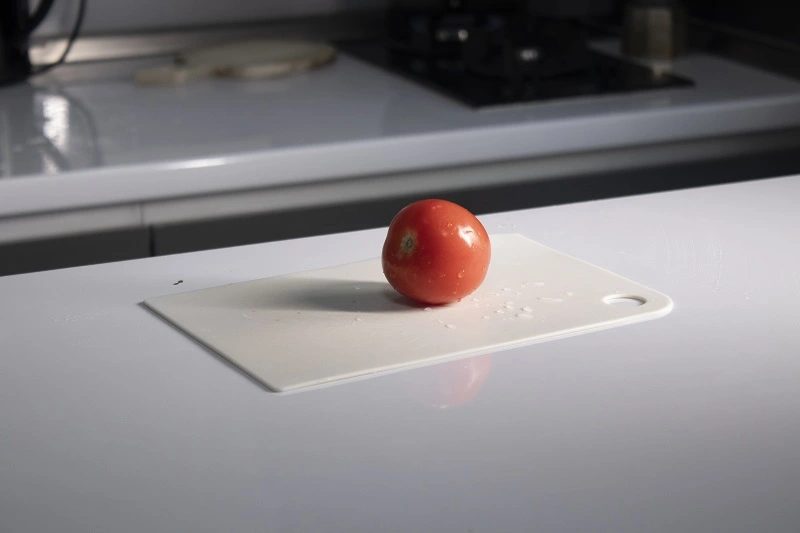Introduction:
In the realm of kitchen safety and food preparation, the cutting board plays a crucial role. Plastic cutting boards have gained popularity due to their durability, ease of maintenance, and affordability. However, the risk of bacterial contamination has always been a concern. To address this issue, the application of antimicrobial agents in plastic cutting boards has emerged as an effective solution, providing an added layer of protection against harmful microorganisms.
What is antimicrobial cutting board?
An antimicrobial cutting board is a kitchen tool designed to inhibit or reduce the growth of microorganisms, such as bacteria, fungi, and molds, on its surface by using antimicrobial technology. These cutting boards are specifically engineered to promote a hygienic environment during food preparation, minimizing the risk of cross-contamination and ensuring the safety of the food being prepared.
Benefits of Antimicrobial Cutting Boards:
Reduced Bacterial Contamination: Antimicrobial cutting boards help minimize the risk of bacterial contamination on the surface, promoting safer food preparation.
Extended Lifespan: The incorporation of antimicrobial agents can contribute to the longevity of the cutting board by preventing microbial degradation.
Easy Maintenance: Antimicrobial cutting boards are often easier to clean and sanitize compared to traditional cutting boards, providing convenience in daily kitchen routines.
Prevention of Cross-Contamination: The antimicrobial properties help prevent the transfer of harmful microorganisms from raw to cooked foods during the food preparation process.
Versatility: Antimicrobial cutting boards are available in various materials, allowing consumers to choose an option that suits their preferences and needs.
Common antimicrobial agents used in antimicrobial cutting board
In antibacterial cutting boards, three types of antibacterial agents are employed, including silver ions, triclosan, and quaternary ammonium compounds. However, silver ions stand out significantly among the three due to their unique and potent advantages. Firstly, silver possesses natural antibacterial properties, effectively inhibiting the growth of various microorganisms. Secondly, silver ions released within the cutting board disrupt the cellular processes of microorganisms, impeding their reproduction. Most importantly, the antibacterial effect of silver ions is relatively long-lasting, providing the cutting board with extended antibacterial protection.
In comparison, while triclosan and quaternary ammonium compounds are also potent antibacterial agents, triclosan may pose environmental concerns, and quaternary ammonium compounds may have skin and respiratory irritations at high concentrations. Considering factors such as cost, environmental impact, and antibacterial efficacy, we firmly believe that silver ions are the preferred antibacterial agent in cutting boards. They not only deliver outstanding antibacterial protection but also align more closely with our high standards for safety and environmental friendliness. Therefore, we are confident that silver ions are the top choice for creating a safer and more hygienic food preparation environment in your kitchen.
How to add the silver ion antimicrobial agent into cutting board?
To add silver ion antimicrobial agents to a cutting board, the selected antimicrobial agent, such as silver nanoparticles or silver zeolites, is mixed thoroughly with the base material during the manufacturing process. The compound is then shaped into the desired cutting board form through molding or extrusion. After curing or cooling, quality control measures are implemented to ensure even distribution. Final processing steps are completed, and the cutting board undergoes testing to verify its antimicrobial properties, adhering to industry regulations and safety guidelines throughout the process.
Is silver ion antimicrobial cutting board safe?
Silver ion antimicrobial cutting boards are generally considered safe, with low toxicity to humans when used appropriately. Reputable manufacturers adhere to regulatory standards, so choosing products from established brands is advisable. Users should follow proper usage and care instructions provided by the manufacturer, including guidelines for cleaning and maintenance. It’s important to note that while silver ions inhibit bacterial growth, regular cleaning and good food handling practices are still essential. Individuals with known allergies or sensitivities to silver should exercise caution and consult with healthcare professionals if needed. Always check product information and reviews to ensure the cutting board meets safety standards.


-300x210.jpg)
